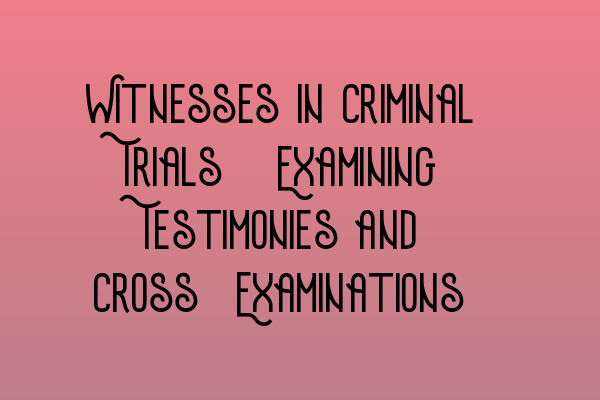Witnesses in Criminal Trials: Examining Testimonies and Cross-Examinations
Welcome to the SQE Criminal Law & Practice Law UK blog, where we delve into various aspects of criminal law and provide valuable insights to aspiring solicitors and legal practitioners. In today’s post, we will focus on witnesses in criminal trials and the critical role they play in the pursuit of justice.
The Importance of Witnesses
Witnesses are individuals who possess information relevant to a criminal case and are called upon to present their testimonies in court. Their accounts help establish facts, provide crucial evidence, and aid in determining the guilt or innocence of the accused.
When examining witnesses, it is essential to conduct a thorough cross-examination to gauge the credibility and reliability of their statements. This process involves questioning witnesses regarding their recollection of events, their perspectives, and any potential biases that may impact their testimonies.
The Role of Cross-Examinations
Cross-examinations are a vital part of the legal process as they allow solicitors to challenge the credibility of witnesses by highlighting inconsistencies and contradictions in their statements. Effective cross-examinations can help cast doubt on the reliability, memory, and truthfulness of witnesses, ultimately influencing the outcome of a trial.
Utilizing effective communication skills, solicitors aim to unveil hidden motives, expose underlying prejudices, and reveal any potential ulterior motives that witnesses may have. This can be achieved through a series of strategic questions designed to elicit crucial information, provoke emotional responses, or test the witness’s memory and knowledge of the events in question.
Preparing for Cross-Examinations
The success of cross-examinations largely depends on meticulous preparation. Solicitors must thoroughly review case files, witness statements, and any available evidence before strategizing their cross-examination techniques.
During the preparation phase, it is critical to identify key weaknesses in the prosecution’s case, analyze inconsistencies in witness statements, and identify any biases or prejudices that may have influenced their testimonies.
To enhance your understanding of cross-examinations and develop your legal skills further, we recommend exploring our comprehensive SQE 1 Preparation Courses and SQE 2 Preparation Courses. These courses offer in-depth knowledge and practical training to help you excel in your legal career.
Conclusion
Witness testimonies and cross-examinations serve as fundamental components of criminal trials. They provide crucial insights into the events in question and help determine the truth. By understanding the importance of witnesses and mastering the art of cross-examinations, solicitors can effectively present their case, protect their clients’ rights, and contribute to the administration of justice.
For further practice and preparation, consider exploring our SQE 1 Practice Exam Questions and SQE 1 Practice Mocks FLK1 FLK2 articles. Additionally, stay updated with the latest SRA SQE exam dates by visiting our SRA SQE Exam Dates page.
Thank you for reading, and we hope you found this article informative and useful. Stay tuned for more insightful content from SQE Criminal Law & Practice Law UK!
